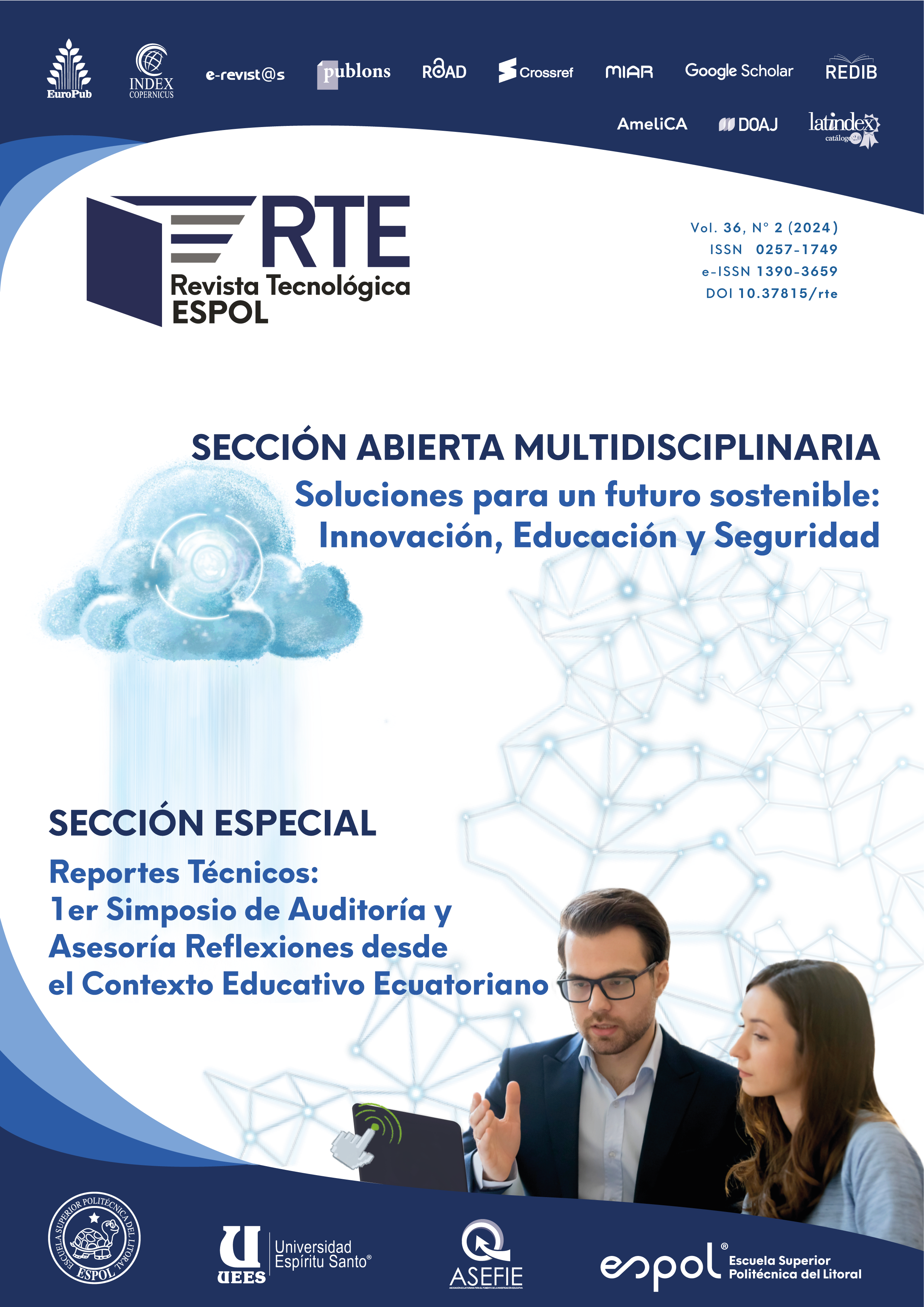En el contexto actual, validar el contenido de las noticias previo a su publicación representa un desafío significativo debido a la inmediatez con que se difunden y la sencillez con la que pueden replicarse, condiciones que favorecen a la propagación de noticias falsas. Proyectos colaborativos como Duke Reporters'Lab y la International Fact-Checking Network IFCN han surgido para promover la veracidad en la verificación de hechos con el fin de combatir diversas manifestaciones de desinformación. En el Ecuador, los medios de verificación de hechos acreditados son Ecuador Chequea y Ecuador Verifica.
Este artículo presenta los resultados de cinco modelos basados en transformadores como BETO, MarIA, RoBERTuito, BERTuit y BERTin, para la clasificación de noticias falsas en idioma español. El sistema de calificación de Ecuador Chequea y Ecuador Verifica se utilizaron para verificar las noticias que se extrajeron de las cuentas de estos medios en X y contenían los tuits creados entre Enero-2020 y Marzo-2024. Los hallazgos muestran que en términos de exactitud, recuperación, precisión y puntuación F1, el modelo de lenguaje MarIA tiene un mejor desempeño que los modelos basados en el idioma español como BERTin, RoBERTuito, BETO y BERTuit.

Esta obra está bajo una licencia internacional Creative Commons Atribución-NoComercial 4.0.
Referencias
Agerri, R., & Agirre, E. (2022). Lessons learned from the evaluation of Spanish Language Models. arXiv preprint arXiv:2212.08390. https://doi.org/10.48550/arXiv.2212.08390
Cañete, J., Chaperon, G., Fuentes, R., Ho, J.-H., Kang, H., & Pérez, J. (2023). Spanish pre-trained bert model and evaluation data. arXiv preprint arXiv:2308.02976. https://doi.org/10.48550/arXiv.2308.02976
De la Rosa, J., Ponferrada, E. G., Villegas, P., González de Prado Salas, P., Romero, M., & Grandury,
M. (2022). Bertin: Efficient pre-training of a spanish language model using perplexity sampling. arXiv preprint arXiv:2207.06814. https://doi.org/10.48550/arXiv.2207.06814
Ding, J., Li, B., Xu, C., Qiao, Y., & Zhang, L. (2023). Diagnosing crop diseases based on domain- adaptive pre-training BERT of electronic medical records. Applied Intelligence, 53(12), 15979-15992. https://doi.org/10.1007/s10489-022-04346-x
Duke Reporters' Lab. (2024). About the Lab. https://reporterslab.org/about-the-lab/
Duke Reporters' Lab. (2024). Global Fact-Checking sites. https://reporterslab.org/fact- checking/
Ecuador Chequea. (2024a, September 3). Metodologia - Ecuador Chequea. https://ecuadorchequea.com/metodologia/
Ecuador Chequea. (2024b, September 13). Nuestra historia - Ecuador Chequea. https://ecuadorchequea.com/historia/
Ecuador Verifica. (2024, February 17). QUIÉNES SOMOS - Ecuador verifica. https://ecuadorverifica.org/quienes-somos/
Garrido-Muñoz, I., Martínez-Santiago, F., & Montejo-Ráez, A. (2023). MarIA and BETO are sexist:
Evaluating gender bias in large language models for Spanish. Language Resources and Evaluation 58, 1387–1417. https://doi.org/10.1007/s10579-023-09670-3
González, J., Hurtado, L.-F., & Pla, F. (2021). TWilBert: Pre-trained deep bidirectional transformers for Spanish. Neurocomputing, 426, 58-69. https://doi.org/10.1016/j.neucom.2020.09.078
Gutiérrez-Fandiño, A., Armengol-Estapé, J., Pàmies, M., Llop-Palao, J., Silveira-Ocampo, J., Pio Carrino, C., . . . Villega, M. (2021). Maria: Spanish language models. {arXiv preprint arXiv:2107.07253.
https://doi.org/10.26342/2022-68-3
Huertas-Tato, J., Martín, A., & Camacho, D. (2022). BERTuit: Understanding Spanish language in X through a native transformer. arXiv preprint arXiv:2204.03465. https://doi.org/10.48550/arXiv.2204.03465
IFCN Code of Principles. (2024a). The commitments of the code of principles. https://www.ifcncodeofprinciples.poynter.org/
IFCN Code of Principles. (2024b). Verified signatories of the IFCN code of principles. https://www.ifcncodeofprinciples.poynter.org/signatories
Ireton, C., & Posetti, J. Eds. (2020). Periodismo,“noticias falsas” & desinformación: Manual de Educación y Capacitación en periodismo. París; Santo Domingo, Francia: Organización de las Naciones Unidas para la Educación, la Ciencia y la Cultura UNESCO y el Ministerio de la Presidencia de la República Dominicana. https://unesdoc.unesco.org/ark:/48223/pf0000373349
Martínez-Gallego, K., Álvarez-Ortiz , & Arias-Londoño, J. (2021). Fake News Detection in Spanish Using Deep Learning Techniques. arXiv preprint arXiv:2110.06461v1
https://doi.org/10.48550/arXiv.2110.06461
Martinez-Rico, J. R., Araujo, L., & Martinez-Romo, J. (2024). Building a framework for fake news detection in the health domain. PLOS ONE, 19(7), e0305362. https://doi.org/10.1371/journal.pone.0305362
Peña, A., Morales, A., Fierrez, J., Serna, I., Ortega-Garcia, J., Puente, Í., Córdova, J., & Córdova, G. (2023). Leveraging Large Language Models for Topic Classification in the Domain of Public Affairs. En M. Coustaty & A. Fornés (Eds.), Document Analysis and Recognition – ICDAR 2023 Workshops (pp. 20-33). Springer Nature Switzerland. https://doi.org/10.1007/978-3-031-41498-5_2
Pérez, J. M., Furman, D. A., Alemany, L. A., & Luque, F. (2022). RoBERTuito: A pre-trained language model for social media text in Spanish (No. arXiv:2111.09453). arXiv. https://doi.org/10.48550/arXiv.2111.09453
Poynter. (2024). Red Internacional de Verificación de Datos (IFCN). https://www.poynter.org/ifcn/
Sarker, I. H. (2021). Deep Learning: A Comprehensive Overview on Techniques, Taxonomy, Applications and Research Directions. SN Computer Science, 2(6), 420. https://doi.org/10.1007/s42979-021-00815-1
Sarker, I. H. (2022). AI-Based Modeling: Techniques, Applications and Research Issues Towards Automation, Intelligent and Smart Systems. SN Computer Science, 3(2), 158. https://doi.org/10.1007/s42979-022-01043-x
Sellami, R., Sadat, F., & Beluith, L. H. (2018). Building and Exploiting Domain-Specific Comparable Corpora for Statistical Machine Translation. En K. Shaalan, A. E. Hassanien, & F. Tolba (Eds.), Intelligent Natural Language Processing: Trends and Applications (pp. 659-676). Springer International Publishing. https://doi.org/10.1007/978-3-319-67056- 0_31







